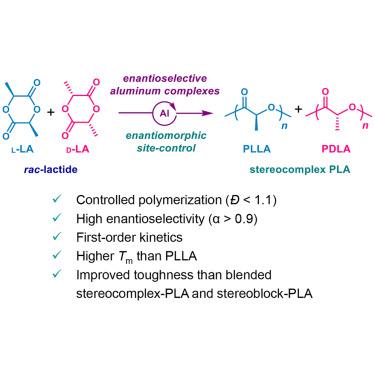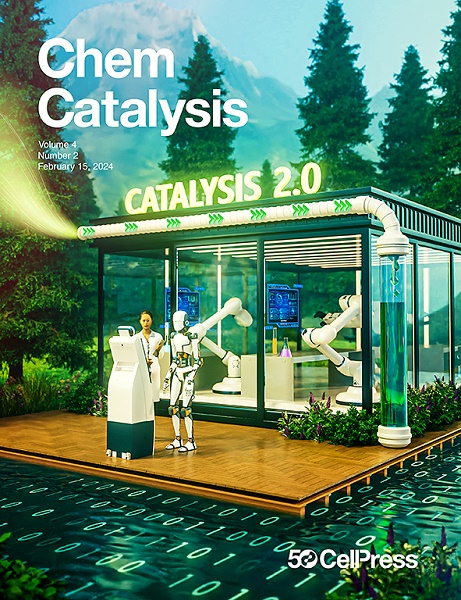Enantioselective polymerization of racemic lactide for stereocomplex poly(lactic acid)
IF 11.6
Q1 CHEMISTRY, PHYSICAL
引用次数: 0
Abstract
Poly(lactic acid) (PLA) is a leading degradable and biocompatible polymer in the plastics industry. Stereocomplex PLA—a mixture of poly(l-lactic acid) and poly(d-lactic acid)—exhibits enhanced mechanical toughness and an elevated melting temperature compared to other PLA stereoisomers. However, the lack of highly enantioselective catalysts has prevented the single-step production of stereocomplex PLA from inexpensive racemic lactide. This work presents the discovery of chiral aluminum catalysts that are highly active for enantioselective lactide polymerization. Using a mixture of chiral catalysts with opposite enantioselectivities allowed for the single-step production of highly isotactic stereocomplex PLA from racemic lactide. The obtained stereocomplex PLA was tougher and more ductile than poly(l-lactic acid), stereoblock PLA, and even conventionally blended stereocomplex PLA. Computational studies revealed that the enantiocontrol exerted by the bimetallic aluminum complexes arises from dispersion interactions between the ligand and lactide within the catalyst cleft.

外消旋丙交酯对立体配合物聚乳酸的对映选择性聚合
聚乳酸(PLA)是塑料工业中领先的可降解和生物相容性聚合物。立体配合物PLA是聚l-乳酸和聚d-乳酸的混合物,与其他PLA立体异构体相比,具有增强的机械韧性和更高的熔化温度。然而,高对映选择性催化剂的缺乏阻碍了从廉价的外消旋丙交酯一步合成立体配合物PLA。这项工作提出了手性铝催化剂的发现,是高度活跃的对映选择性丙交酯聚合。使用具有相反对映选择性的手性催化剂的混合物,可以一步从外消旋丙交酯中生产高度等规立体配合物PLA。所制得的立体配合物PLA比聚l-乳酸、立体嵌块PLA甚至常规共混的立体配合物PLA更坚韧、更有韧性。计算研究表明,双金属铝配合物的对映控制是由配体和丙交酯在催化剂间隙内的分散相互作用引起的。
本文章由计算机程序翻译,如有差异,请以英文原文为准。
求助全文
约1分钟内获得全文
求助全文
来源期刊
CiteScore
10.50
自引率
6.40%
发文量
0
期刊介绍:
Chem Catalysis is a monthly journal that publishes innovative research on fundamental and applied catalysis, providing a platform for researchers across chemistry, chemical engineering, and related fields. It serves as a premier resource for scientists and engineers in academia and industry, covering heterogeneous, homogeneous, and biocatalysis. Emphasizing transformative methods and technologies, the journal aims to advance understanding, introduce novel catalysts, and connect fundamental insights to real-world applications for societal benefit.

 求助内容:
求助内容: 应助结果提醒方式:
应助结果提醒方式:


